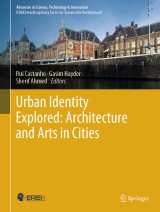Details
Urban Identity Explored: Architecture and Arts in Cities
Advances in Science, Technology & Innovation
|
213,99 € |
|
| Verlag: | Springer |
| Format: | |
| Veröffentl.: | 25.10.2024 |
| ISBN/EAN: | 9783031606410 |
| Sprache: | englisch |
Dieses eBook enthält ein Wasserzeichen.
Beschreibungen
<p>This book systematically examines historical perspectives, meticulously unveiling the nuanced narratives embedded within cityscapes across epochs, providing a comprehensive chronicle of architectural evolution. It conducts a thorough exploration of cultural heritage and transformation, illuminating the dynamic interplay of diverse traditions that breathe vitality into urban landscapes, shaping their unique character. The discourse navigates the intricate terrain of urban sustainability and fragility, meticulously analyzing the delicate equilibrium required to preserve historical integrity while embracing sustainable urban development imperatives. Diverse perspectives on architectural heritage are thoughtfully presented, amplifying the voices often marginalized, and contributing to a more inclusive understanding of our shared history.</p>
<p>Rui Alexandre Castanho holds an International Ph.D. on Sustainable Planning in Borderlands. Nowadays, he is Professor at the WSB University, Poland, and Visitor Professor at the University of Johannesburg, South Africa. He is European Climate Pact Ambassador. Besides, he completed Post-doc Researcher on the GREAT Project at the University of Azores, Ponta Delgada, Portugal. He is also Author and/or Editor of 20 books, more than 140 indexed peer-review papers, 90 indexed book chapters, and 90 conference papers and made several presentations worldwide academic events as keynote speaker.</p>
<p> </p>
<p>Gasim Hayder is Associate Professor for Civil and Environmental Engineering. He received his Ph.D. in Civil Engineering from Universiti Teknologi PETRONAS (UTP), Malaysia. He is MIET and Chartered Engineer (CEng) from the Engineering Council (UK). He teaches, conducts research and provides short courses and consultancy services to industry, especially in the field of water and wastewater assessment and monitoring. He is active in Water & Environmental Engineering and also Environment and Sustainable Development. He has extensive practical engineering, teaching, and management experiences. He has several publications of journals and books, reviewer for many top journals, member committee for several conferences, holds patents, and has received national and international awards.</p>
<p> </p>
<p>Sherif Ahmed Ibrahim Mahmoud is Associate Professor at the Architecture Engineering Department, Military Technical College (MTC), Cairo, Egypt. He received his Ph.D. in Building Engineering from Concordia University, Montreal, Canada. He is Head of the Architecture Engineering Department at MTC. He is Member of the Center of Research Excellence for Urban Environment and Sustainability Governance. He teaches several courses for undergraduate and postgraduate students concerning building technology, green architecture, and sustainable architecture. Also, he is Visiting Professor in the Architecture Engineering Department at Al Obour Higher Institute for Engineering and Technology (OHI). He has participated in design, executing working, and workshop drawings for several mega projects in Egypt as well as supervision on the construction of these projects. He has several publications in high-impact factor journals and international related to the sustainability of buildings and energy efficiency. Also, he is Reviewer for several conferences and journals.</p>
<p> </p>
<p>Gasim Hayder is Associate Professor for Civil and Environmental Engineering. He received his Ph.D. in Civil Engineering from Universiti Teknologi PETRONAS (UTP), Malaysia. He is MIET and Chartered Engineer (CEng) from the Engineering Council (UK). He teaches, conducts research and provides short courses and consultancy services to industry, especially in the field of water and wastewater assessment and monitoring. He is active in Water & Environmental Engineering and also Environment and Sustainable Development. He has extensive practical engineering, teaching, and management experiences. He has several publications of journals and books, reviewer for many top journals, member committee for several conferences, holds patents, and has received national and international awards.</p>
<p> </p>
<p>Sherif Ahmed Ibrahim Mahmoud is Associate Professor at the Architecture Engineering Department, Military Technical College (MTC), Cairo, Egypt. He received his Ph.D. in Building Engineering from Concordia University, Montreal, Canada. He is Head of the Architecture Engineering Department at MTC. He is Member of the Center of Research Excellence for Urban Environment and Sustainability Governance. He teaches several courses for undergraduate and postgraduate students concerning building technology, green architecture, and sustainable architecture. Also, he is Visiting Professor in the Architecture Engineering Department at Al Obour Higher Institute for Engineering and Technology (OHI). He has participated in design, executing working, and workshop drawings for several mega projects in Egypt as well as supervision on the construction of these projects. He has several publications in high-impact factor journals and international related to the sustainability of buildings and energy efficiency. Also, he is Reviewer for several conferences and journals.</p>
<p>This book systematically examines historical perspectives, meticulously unveiling the nuanced narratives embedded within cityscapes across epochs, providing a comprehensive chronicle of architectural evolution. It conducts a thorough exploration of cultural heritage and transformation, illuminating the dynamic interplay of diverse traditions that breathe vitality into urban landscapes, shaping their unique character. The discourse navigates the intricate terrain of urban sustainability and fragility, meticulously analyzing the delicate equilibrium required to preserve historical integrity while embracing sustainable urban development imperatives. Diverse perspectives on architectural heritage are thoughtfully presented, amplifying the voices often marginalized, and contributing to a more inclusive understanding of our shared history.</p>
Explores the historical perspectives Provides cultural history and evolution Discusses urban sustainability and fragility


















